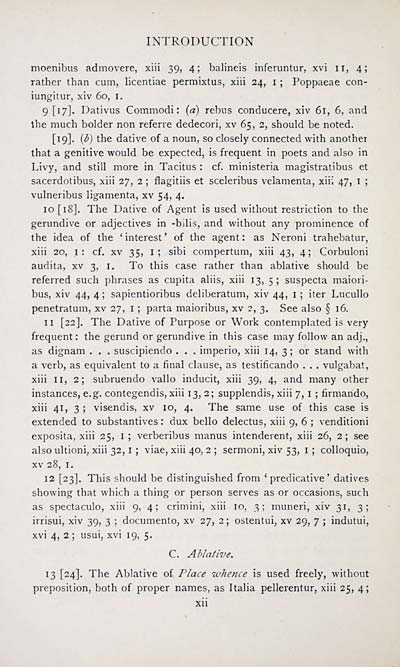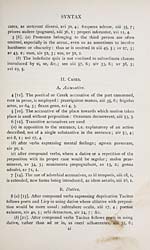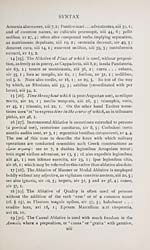Download files
Complete book:
Individual page:
Thumbnail gallery: Grid view | List view

INTRODUCTION
moenibus admovere, xiii 39, 4; balineis inferuntur, xvi 11, 4;
rather than cum, licentiae permixtus, xiii 24, i ; Poppaeae con-
iungitur, xiv 60, i.
9 [17]. Dativus Commodi : (a) rebus conducere, xiv 61, 6, and
the much bolder non referre dedecori, xv 65, 2, should be noted.
[19]. (d) the dative of a noun, so closely connected with another
that a genitive would be expected, is frequent in poets and also in
Livy, and still more in Tacitus : cf. ministeria magistratibus et
sacerdotibus, xiii 27, 2 ; flagitiis et sceleribus velamenta, xiii 47, i ;
vulneribus ligamenta, xv 54, 4.
10 [18]. The Dative of Agent is used without restriction to the
gerundive or adjectives in -bills, and without any prominence of
the idea of the 'interest' of the agent: as Neroni trahebatur,
xiii 20, i: cf. xv 35, i; sibi compertum, xiii 43, 4; Corbuloni
audita, xv 3, i. To this case rather than ablative should be
referred such phrases as cupita aliis, xiii 13, 5 ; suspecta maiori-
bus, xiv 44, 4 ; sapientioribus deliberatum, xiv 44, I ; iter Lucullo
penetratum, xv 27, l ; parta maioribus, xv 2, 3. See also § 16.
11 [22]. The Dative of Purpose or Work contemplated is very
frequent: the gerund or gerundive in this case may follow an adj.,
as dignam . . . suscipiendo . . . imperio, xiii 14, 3 ; or stand with
a verb, as equivalent to a final clause, as testificando . . . vulgabat,
xiii II, 2; subruendo vallo inducit, xiii 39, 4, and many other
instances, e.g. contegendis, xiii 13, 2; supplendis, xiii 7, i ; firmando,
xiii 41, 3 ; visendis, xv 10, 4. The same use of this case is
extended to substantives : dux bello delectus, xiii 9, 6 ; venditioni
exposita, xiii 25, i ; verberibus nianus intenderent, xiii 26, 2; see
also ultioni, xiii 32, 1 ; viae, xiii 40, 2 ; sermoni, xiv 53, i ; colloquio,
XV 28, I.
12 [23]. This should be distinguished from 'predicative' datives
showing that which a thing or person serves as or occasions, such
as spectaculo, xiii 9, 4; crimini, xiii 10, 3; muneri, xiv 31, 3;
irrisui, xiv 39, 3 ; documento, xv 27, 2 ; ostentui, xv 29, 7 ; indutui,
xvi 4, 2 ; Usui, xvi 19, 5.
C. Ablative.
13 [24]. The Ablative of Place whence is used freely, without
preposition, both of proper names, as Italia pellerentur, xiii 25, 4;
xii
moenibus admovere, xiii 39, 4; balineis inferuntur, xvi 11, 4;
rather than cum, licentiae permixtus, xiii 24, i ; Poppaeae con-
iungitur, xiv 60, i.
9 [17]. Dativus Commodi : (a) rebus conducere, xiv 61, 6, and
the much bolder non referre dedecori, xv 65, 2, should be noted.
[19]. (d) the dative of a noun, so closely connected with another
that a genitive would be expected, is frequent in poets and also in
Livy, and still more in Tacitus : cf. ministeria magistratibus et
sacerdotibus, xiii 27, 2 ; flagitiis et sceleribus velamenta, xiii 47, i ;
vulneribus ligamenta, xv 54, 4.
10 [18]. The Dative of Agent is used without restriction to the
gerundive or adjectives in -bills, and without any prominence of
the idea of the 'interest' of the agent: as Neroni trahebatur,
xiii 20, i: cf. xv 35, i; sibi compertum, xiii 43, 4; Corbuloni
audita, xv 3, i. To this case rather than ablative should be
referred such phrases as cupita aliis, xiii 13, 5 ; suspecta maiori-
bus, xiv 44, 4 ; sapientioribus deliberatum, xiv 44, I ; iter Lucullo
penetratum, xv 27, l ; parta maioribus, xv 2, 3. See also § 16.
11 [22]. The Dative of Purpose or Work contemplated is very
frequent: the gerund or gerundive in this case may follow an adj.,
as dignam . . . suscipiendo . . . imperio, xiii 14, 3 ; or stand with
a verb, as equivalent to a final clause, as testificando . . . vulgabat,
xiii II, 2; subruendo vallo inducit, xiii 39, 4, and many other
instances, e.g. contegendis, xiii 13, 2; supplendis, xiii 7, i ; firmando,
xiii 41, 3 ; visendis, xv 10, 4. The same use of this case is
extended to substantives : dux bello delectus, xiii 9, 6 ; venditioni
exposita, xiii 25, i ; verberibus nianus intenderent, xiii 26, 2; see
also ultioni, xiii 32, 1 ; viae, xiii 40, 2 ; sermoni, xiv 53, i ; colloquio,
XV 28, I.
12 [23]. This should be distinguished from 'predicative' datives
showing that which a thing or person serves as or occasions, such
as spectaculo, xiii 9, 4; crimini, xiii 10, 3; muneri, xiv 31, 3;
irrisui, xiv 39, 3 ; documento, xv 27, 2 ; ostentui, xv 29, 7 ; indutui,
xvi 4, 2 ; Usui, xvi 19, 5.
C. Ablative.
13 [24]. The Ablative of Place whence is used freely, without
preposition, both of proper names, as Italia pellerentur, xiii 25, 4;
xii
Set display mode to: Large image | Transcription
Images and transcriptions on this page, including medium image downloads, may be used under the Creative Commons Attribution 4.0 International Licence unless otherwise stated. ![]()
| Early Gaelic Book Collections > Matheson Collection > Cornelli Taciti annalium > (16) |
|---|
| Permanent URL | https://digital.nls.uk/76567131 |
|---|
| Description | Items from a collection of 170 volumes relating to Gaelic matters. Mainly philological works in the Celtic and some non-Celtic languages. Some books extensively annotated by Angus Matheson, the first Professor of Celtic at Glasgow University. |
|---|
| Description | Selected items from five 'Special and Named Printed Collections'. Includes books in Gaelic and other Celtic languages, works about the Gaels, their languages, literature, culture and history. |
|---|

